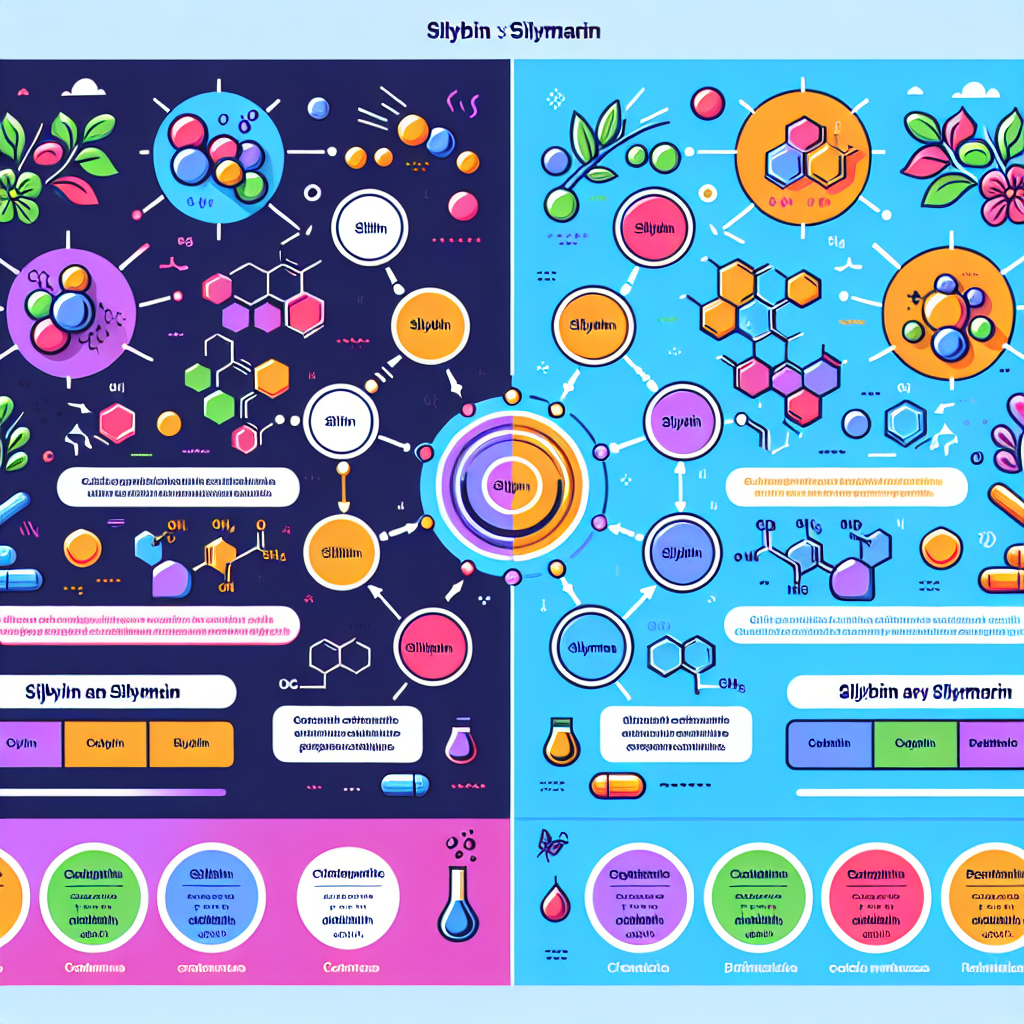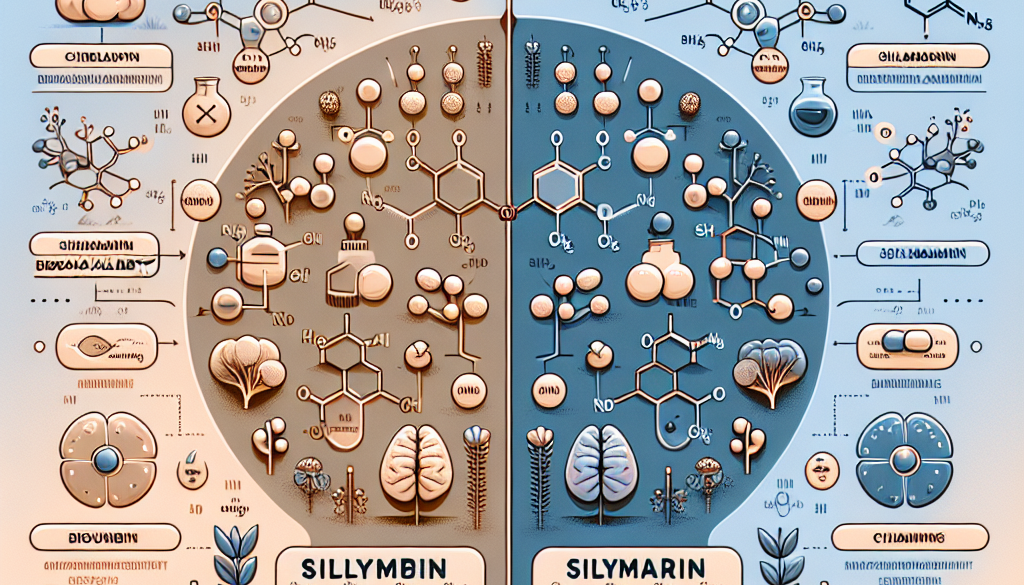Silybin vs Silymarin: Key Differences
-
Table of Contents
- Silybin vs Silymarin: Understanding Their Distinct Benefits
- Introduction to Silybin and Silymarin
- What is Silymarin?
- What is Silybin?
- Key Differences Between Silybin and Silymarin
- Health Benefits of Silybin and Silymarin
- Uses in Medicine and Supplements
- Case Studies and Research
- Choosing Between Silybin and Silymarin
- Conclusion: Silybin and Silymarin for Liver Health
- Discover ETchem’s Protein Products
Silybin vs Silymarin: Understanding Their Distinct Benefits

When it comes to liver health, two natural compounds often come up in discussions: silybin and silymarin. While they are closely related, they are not the same thing. This article will delve into the key differences between silybin and silymarin, their benefits, and how they are used in various health applications.
Introduction to Silybin and Silymarin
Silybin and silymarin are both associated with the milk thistle plant, Silybum marianum, which has been used for centuries as a herbal remedy for a variety of ailments, particularly liver problems. Understanding the distinction between these two compounds is crucial for anyone interested in natural health supplements or liver health.
What is Silymarin?
Silymarin is a complex mixture of flavonolignans extracted from the seeds of the milk thistle plant. It is not a single substance but a group of related compounds that include silybin, isosilybin, silychristin, silydianin, and others. Silymarin acts as an antioxidant and has been shown to have hepatoprotective properties, meaning it can help protect the liver from damage.
What is Silybin?
Silybin, also known as silibinin, is the most active component of silymarin and is responsible for much of its beneficial effects. It is often isolated to increase its potency and is considered the primary active constituent in milk thistle extracts.
Key Differences Between Silybin and Silymarin
- Composition: Silybin is a single compound, whereas silymarin is a mixture of several related compounds.
- Concentration: Silybin is the most abundant and active component in silymarin, but it is not the only one.
- Availability: Silybin can be isolated for supplements, while silymarin is typically found in milk thistle extracts containing a variety of compounds.
- Research Focus: Most research focuses on silybin due to its potent effects, although studies on silymarin as a whole are also common.
Health Benefits of Silybin and Silymarin
Both silybin and silymarin have been studied for their potential health benefits, particularly in relation to liver health. Here are some of the key findings:
- Liver Protection: They have been shown to protect the liver from toxins, including alcohol and certain drugs.
- Antioxidant Effects: Both compounds exhibit strong antioxidant properties, helping to combat oxidative stress.
- Anti-inflammatory Properties: They may help reduce inflammation, which is beneficial for liver health and other conditions.
- Regeneration of Liver Cells: There is evidence to suggest that silybin and silymarin can promote the regeneration of damaged liver cells.
Uses in Medicine and Supplements
Silybin and silymarin are commonly used in supplements aimed at supporting liver health. They are also being investigated for their potential in treating liver diseases such as hepatitis and cirrhosis. Additionally, there is interest in their use in cancer therapy, as they may have anti-cancer properties.
Case Studies and Research
Several studies have highlighted the benefits of silybin and silymarin. For instance, a study published in the “World Journal of Hepatology” found that silymarin significantly improved liver function in patients with alcoholic liver disease. Another study in the “Journal of Dietary Supplements” reported that silybin helped reduce liver enzymes and improved liver function in patients with liver disease.
Choosing Between Silybin and Silymarin
When selecting a supplement, it’s important to consider whether you want a targeted approach with isolated silybin or a broader spectrum of benefits from silymarin. Your healthcare provider can help determine which is more suitable for your needs.
Conclusion: Silybin and Silymarin for Liver Health
In conclusion, while silybin and silymarin are closely related, they have distinct characteristics and benefits. Silybin, as the most potent component of silymarin, is often chosen for its concentrated effects. However, silymarin’s broader range of compounds also offers a comprehensive approach to liver health. Understanding these differences can help consumers make informed decisions about their health supplements.
Discover ETchem’s Protein Products
If you’re looking for high-quality protein products, ETchem offers a range of collagen-based options that can complement your health regimen. Their products are ideal for various applications, including nutraceuticals, pharmaceuticals, and more.
About ETChem:
ETChem, a reputable Chinese Collagen factory manufacturer and supplier, is renowned for producing, stocking, exporting, and delivering the highest quality collagens. They include marine collagen, fish collagen, bovine collagen, chicken collagen, type I collagen, type II collagen and type III collagen etc. Their offerings, characterized by a neutral taste, instant solubility attributes, cater to a diverse range of industries. They serve nutraceutical, pharmaceutical, cosmeceutical, veterinary, as well as food and beverage finished product distributors, traders, and manufacturers across Europe, USA, Canada, Australia, Thailand, Japan, Korea, Brazil, and Chile, among others.
ETChem specialization includes exporting and delivering tailor-made collagen powder and finished collagen nutritional supplements. Their extensive product range covers sectors like Food and Beverage, Sports Nutrition, Weight Management, Dietary Supplements, Health and Wellness Products, ensuring comprehensive solutions to meet all your protein needs.
As a trusted company by leading global food and beverage brands and Fortune 500 companies, ETChem reinforces China’s reputation in the global arena. For more information or to sample their products, please contact them and email karen(at)et-chem.com today.




